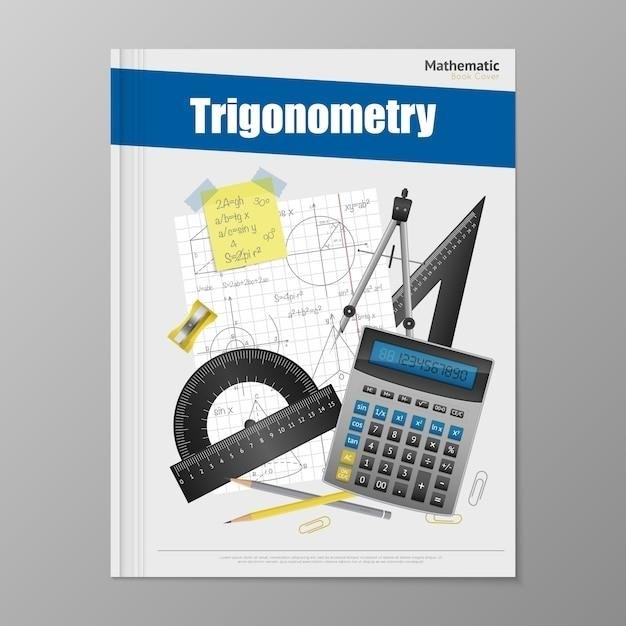Understanding the ALEKS Math Placement Test
The ALEKS math placement test assesses your math skills to determine appropriate college course placement․ It’s adaptive, adjusting difficulty based on your answers․ Colleges use it to ensure students are in suitable math classes, saving time and resources․
What is the ALEKS Math Test?
The ALEKS (Assessment and LEarning in Knowledge Spaces) math test is a computerized, adaptive assessment used by many colleges and universities to place students into the appropriate mathematics courses based on their existing knowledge․ Unlike traditional multiple-choice exams, ALEKS presents questions of varying difficulty, adjusting in real-time based on your responses․ This adaptive nature ensures a precise evaluation of your skills, pinpointing areas of strength and weakness․ The test covers a broad range of mathematical concepts, from basic arithmetic to more advanced topics like algebra, geometry, and even calculus, depending on the specific institution’s requirements․ Your performance isn’t judged simply by a percentage correct but by a score reflecting your mastery across the tested material․ This score then informs your placement into the most suitable math course for your skill level․ The goal is to optimize your educational path, ensuring you’re neither overwhelmed nor under-challenged․
Why is ALEKS Important for College Placement?
The ALEKS math placement test plays a crucial role in ensuring students are enrolled in college math courses appropriately matched to their abilities․ Accurate placement prevents students from being either overwhelmed by overly challenging coursework or bored by material too elementary․ Starting in a suitable course maximizes learning potential and increases the likelihood of success․ By accurately assessing your current mathematical understanding, ALEKS helps avoid the frustration and time loss associated with being placed in an inappropriate class․ A proper placement, guided by ALEKS, can save you time and money by preventing the need for repeated courses or remedial work․ Ultimately, ALEKS contributes to a more efficient and effective college experience, setting you on the right academic track from the start․ It’s a tool designed to optimize your learning journey, aligning your course selection with your individual skills and knowledge base․
How the ALEKS Test Works⁚ Adaptive Assessment
Unlike traditional tests, ALEKS employs an adaptive assessment methodology․ This means the difficulty of questions adjusts dynamically based on your responses․ Initially, you’ll encounter questions of moderate difficulty․ Correct answers lead to progressively harder questions, while incorrect answers result in easier ones․ This personalized approach ensures the test accurately gauges your mathematical proficiency across a wide range of concepts․ The adaptive nature of ALEKS optimizes the assessment process, focusing on the specific areas where you need to demonstrate competence․ The test doesn’t simply measure your ability to answer a set number of questions correctly; it meticulously maps your knowledge and identifies gaps in understanding․ This adaptive system provides a more precise and efficient evaluation than traditional methods, leading to more accurate placement recommendations․
Preparing for the ALEKS Math Test
Effective preparation is crucial for success․ Utilize ALEKS practice tests and identify your weaknesses․ Develop a study schedule and use recommended resources for targeted review․
Utilizing ALEKS Practice Tests
ALEKS practice tests are invaluable tools for gauging your preparedness and identifying areas needing improvement․ Many resources offer free and paid practice tests mirroring the actual exam format․ These tests aren’t just about achieving a high score; they’re diagnostic tools․ Analyze your performance on each practice test, pinpointing specific concepts where you struggled․ Don’t just focus on the correct answers; delve into the explanations for incorrect responses․ This process reveals knowledge gaps and allows for focused studying․ Regular practice tests, ideally spaced over several weeks, build confidence and familiarity with the test’s structure and question types․ Remember, the goal is not just to get the right answers but to understand the underlying mathematical principles․ By strategically using practice tests, you can optimize your study time and maximize your chances of success on the actual ALEKS Math Placement Test․
Effective ALEKS Math Prep Strategies
Effective preparation for the ALEKS Math Placement Test involves a multifaceted approach․ Begin by reviewing fundamental math concepts․ Ensure you have a solid grasp of arithmetic, algebra, and geometry before tackling more advanced topics․ Create a study schedule that allocates sufficient time for each subject area, prioritizing areas where you feel less confident․ Utilize a variety of study resources, including textbooks, online tutorials, and practice problems․ Don’t just passively read; actively engage with the material by solving problems and working through examples․ Consider forming a study group with peers to discuss challenging concepts and share strategies․ Regularly assess your progress by taking practice tests to identify your strengths and weaknesses․ Most importantly, remain calm and focused during the test itself․ Remember, the ALEKS test aims to accurately place you in the appropriate math course; it’s not a pass/fail exam․ A structured approach, combined with consistent effort, will significantly enhance your performance․
Recommended Study Resources and Materials
For optimal ALEKS Math test preparation, a multi-pronged resource strategy is key․ Your college likely provides preparatory materials; utilize these first․ These often include practice tests tailored to their specific curriculum and expectations․ Supplement these with reputable online resources․ Many websites offer free practice problems and tutorials covering various math topics․ Consider purchasing a dedicated ALEKS prep book․ These books frequently contain practice tests and detailed explanations of solutions, aiding comprehension․ If you struggle with specific concepts, online video tutorials can be invaluable․ Look for videos that break down complex ideas into smaller, manageable parts․ Don’t hesitate to seek additional support․ Many colleges offer tutoring services specifically for placement exams․ A tutor can provide personalized guidance and address individual weaknesses․ Remember, the best resources are those that cater to your learning style and address your specific areas of difficulty․ Effective utilization of these varied resources will maximize your preparation efforts․

Key Topics Covered in the ALEKS Math Test
The ALEKS exam covers a broad range of math topics, from basic arithmetic and algebra to more advanced concepts like trigonometry and calculus․ Preparation should encompass all these areas․
Basic Arithmetic and Number Operations
Mastering basic arithmetic is fundamental for success on the ALEKS math placement test․ This section tests your understanding of whole numbers, integers, fractions, decimals, and percentages․ Expect questions involving addition, subtraction, multiplication, and division of various number types․ Practice converting between fractions, decimals, and percentages, as this is frequently tested․ Understanding order of operations (PEMDAS/BODMAS) is crucial for accurately solving multi-step problems․ Pay close attention to the signs and ensure you are comfortable working with both positive and negative numbers․ Remember to review the properties of real numbers, including commutative, associative, and distributive properties․ Thorough practice with these foundational concepts will significantly improve your performance on the ALEKS test and build a strong base for more advanced topics․
Algebraic Expressions and Equations
The ALEKS math placement test extensively covers algebraic expressions and equations․ You should be proficient in simplifying expressions by combining like terms and applying the distributive property․ Solving linear equations and inequalities is a key component, including those involving fractions and decimals․ Practice solving systems of linear equations using methods such as substitution and elimination․ Understanding the concept of exponents and radicals is essential; be prepared to simplify expressions involving these․ Familiarity with factoring quadratic expressions and solving quadratic equations using various techniques (factoring, quadratic formula, completing the square) is crucial․ Furthermore, grasp the concepts of functions, including evaluating functions and understanding their graphs․ Practice working with different types of algebraic expressions and equations to build confidence and accuracy in solving problems efficiently․
Geometry and Measurement
The ALEKS math placement test includes a significant portion dedicated to geometry and measurement․ Mastering fundamental geometric concepts is key to success․ This includes understanding and applying formulas for calculating areas and perimeters of various shapes (triangles, rectangles, circles)․ Volume and surface area calculations for three-dimensional shapes (cubes, spheres, cylinders) are also frequently tested․ You’ll need to be comfortable working with angles, including complementary, supplementary, and vertical angles․ Knowledge of similar triangles and the Pythagorean theorem is essential․ Understanding basic trigonometric functions (sine, cosine, tangent) may also be necessary, depending on the placement level․ Ensure you are comfortable converting between different units of measurement (e․g․, inches to feet, centimeters to meters)․ Practice solving word problems involving geometric shapes and measurements to prepare for the diverse range of questions you may encounter․
Advanced Math Concepts (Trigonometry, Calculus)
While the ALEKS Math Placement Test’s focus is primarily on foundational math, advanced concepts like trigonometry and calculus might appear, especially if you’re aiming for higher-level math courses․ Trigonometry questions might involve unit circles, trigonometric identities, solving trigonometric equations, and applying trigonometric functions to solve real-world problems involving angles and triangles․ Calculus questions, if included, are likely to be introductory, focusing on basic differentiation and integration concepts․ Understanding limits, derivatives, and integrals may be necessary for placement into higher-level courses․ Reviewing fundamental concepts like functions, graphs, and their properties is crucial for building a solid base to handle these more advanced topics․ Remember that the depth of coverage for these advanced topics will vary depending on the specific institution and the intended level of placement․

Improving Your ALEKS Score
Strategic study, focusing on weaknesses revealed through practice tests, is key․ Consistent effort and seeking extra help when needed significantly boost scores and improve placement․
Creating a Study Schedule and Routine
To effectively prepare for the ALEKS math placement test, establishing a structured study schedule is crucial․ Begin by assessing your current math proficiency and identifying areas needing improvement․ This self-assessment will inform the creation of a personalized study plan․ Allocate specific time slots each day or week for focused study sessions, ensuring consistency․ Break down your study time into manageable chunks to prevent burnout and maintain focus․ Incorporate regular breaks to optimize learning and retention․ A well-structured routine helps maintain momentum and encourages consistent progress towards your target score․ Consider incorporating different learning techniques, such as practice problems, review of concepts, and the use of online resources․ Regularly review previously covered material to reinforce learning and identify any persistent knowledge gaps․ Remember that consistent effort and a well-structured approach are far more effective than sporadic cramming sessions․
Identifying and Addressing Weaknesses
A key aspect of effective ALEKS preparation involves pinpointing and rectifying areas of weakness in your mathematical understanding․ Start by taking a diagnostic practice test to gauge your current skill level and highlight subject areas where you struggle․ Carefully analyze your mistakes on practice problems; don’t just focus on getting the right answer, but understand the underlying concepts․ Use online resources, textbooks, or tutoring to address identified weaknesses․ Focus on building a strong foundational understanding before tackling more advanced topics․ Create flashcards or utilize other memory aids to reinforce challenging concepts․ Seek extra help from teachers, tutors, or online communities if you’re struggling with specific concepts․ Don’t hesitate to break down complex problems into smaller, more manageable parts․ Regularly revisit previously challenging topics to ensure you’ve solidified your understanding and can consistently apply the relevant concepts․ Persistent effort in addressing weaknesses will significantly improve your overall performance on the ALEKS assessment․
Seeking Additional Help and Support
Don’t hesitate to seek assistance if you encounter difficulties while preparing for the ALEKS math placement test․ Many resources are available to support your learning journey․ Your college or university likely offers tutoring services specifically designed to help students excel on placement exams․ These services often provide personalized guidance and support tailored to your individual needs and learning style․ Online forums and communities dedicated to ALEKS preparation can be invaluable for connecting with other students and accessing shared resources․ Consider enlisting the help of a private tutor if you prefer one-on-one instruction․ Many online platforms offer tutoring services for various subjects, including mathematics․ Remember, seeking help isn’t a sign of weakness; it’s a proactive step towards improving your understanding and achieving a better score on the ALEKS exam․ Utilize all available resources to maximize your preparation efforts and boost your confidence․
